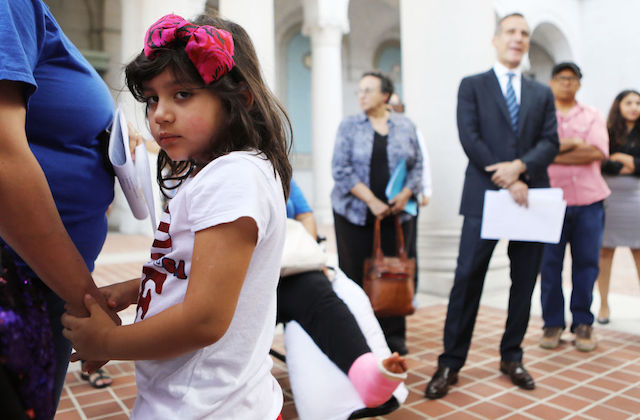An estimated 200,000 Salvadorans “living and working in the U.S.” will continue to be eligible for Temporary Protected Status (TPS), NPR reports. The Department of Homeland Security (DHS) made the announcement on Monday (October 28):
rnt
The Trump administration is extending the validity of work permits for El Salvadorans with Temporary Protected Status (TPS) through January 4, 2021. Additionally, the Trump Administration is providing El Salvadorans with TPS an additional 365 days after the conclusion of the TPS-related lawsuits to repatriate back to their home country.
As Colorlines previously reported, on January 8, 2018, the federal government ended TPS eligibility for Salvadorans who had been “permitted to enter and live in the United States following devastating earthquakes and civil unrest in their native El Salvador.” As NPR notes, TPS is a federal program typically “reserved to help foreign nationals from countries embroiled in wars or facing natural disasters.” The revocation was one in a long line of actions that attempted to end TPS for people from Haiti, Nicaragua and Sudan, among other countries.
U.S. Ambassador to El Salvador Ronald Johnson joined President Nayib Bukele of El Salvador on Twitter to make their own announcements about the TPS extension. “This is recognition of the achievements and good work of the government of Nayib Bukele," said Johnson.
However, Ken Cuccinelli, acting director of U.S. Citizenship and Immigration Services (USCIS), says people have the wrong idea about the Trump administration’s latest move. Per NPR:
rnt
“A clarification: some reporting has spoken of ‘extending TPS,” Cuccinelli said in a tweet. “That has important legal meaning, and that’s not what happened with the agreements. Rather, work permits for Salvadorans will be extended for one year past resolution of litigation for an orderly wind down period.”
According to the DHS statement, the Trump administration still wants to repatriate people to El Salvador via “an orderly and responsible process,” but there are concerns that “a sudden inflow of 250,000 individuals to El Salvador could spark another mass migration to the U.S. and reinvigorate the crisis at the southern border.”
